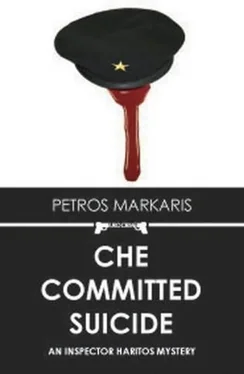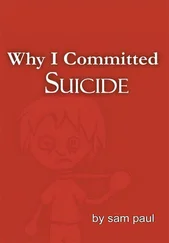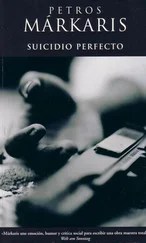It was already ten in the morning and I sat down with Koula to make a plan for the day. I told her to rope in her cousin again and go to the records department at the Ministry of Trade and search through Vakirtzis’s companies.
‘I don’t know what you’ll find,’ I said. ‘Logaras spoke about companies in which Vakirtzis was either a visible or invisible shareholder. If we’re lucky, we might come across the companies where he appears as a shareholder.’
‘And what about the victims’ computers?’
‘Afterwards. First let’s find out what companies Vakirtzis was involved in. I can smell at rat, though it might be my nose that’s to blame what with all the pollution I’m breathing in constantly.’
I left her to call her cousin so they could get down to work.
Loukas Stefanakos was a Member of Parliament for a constituency in the suburbs of Athens and had his office at 22 Dardanelion Street, close to the park in Aigaleio. With the traffic, it was like going from Athens to Patras, a good three hours’ drive.
The sky was full of rain clouds and the sun nowhere to be seen. That meant that we were in for a bout of unbearable humidity till we got our fifteen-minute downpour and the sky cleared. In Athens, the weather finds relief in the same way as the people: a sudden outburst that sweeps your legs from under you and then it’s as if nothing had happened.
The traffic flowed normally, albeit slowly, as far as Peiraios Street. There was even less traffic in Peiraios Street and I got my hopes up, but the miracle was short-lived. At the lights at the junction with Iera Odos, I ran into an endless line of traffic dotted with patrol cars and ambulances. After ten minutes, I began cursing Stefanakos to high heaven for having opened his office in Aigaleio. What was wrong with Glyfada or Nea Smyrni? But Stefanakos, being a leftist, wanted to be in a traditional working-class district like Aigaleio, even though today the working-class district is hidden behind boutiques and fashion stores, rather like Stefanakos was hidden behind his wife’s businesses.
After twenty minutes or so, I finally reached the lights and came upon a pile-up involving a coach and three cars. The coach had been left abandoned in the middle of the junction, facing in the direction of Kifissou Avenue, while a car coming from Iera Odos had evidently crashed into it and two other cars had crashed into the back of the first car. The road was almost completely blocked with only one car getting through every five minutes, and that thanks to a policeman who kept emptying his lungs into his whistle.
Once past the point of the accident, Iera Odos opened up before me like the National Road on Easter Sunday and I sped along. It’s a fact that you always make up the time you lose. What you don’t get back is your health and peace of mind.
Dardanelion Street was parallel to Thivon Street. Number 22 was a new block of the type put up overnight. This, too, was part of the game of hide and seek played in the district: pulling down the old workers’ houses and putting up new blocks of flats overnight. Stefanakos’s office was on the second floor; a two-room flat with adjoining rooms – the one for the secretary, the other for the politician. Stella, Stefanakos’s secretary, had already been informed by Mrs Stathatos because she recognised my name. Before sitting down, I glanced around me. There was nothing that particularly attracted my attention, other than the flowers. The entire outer office was filled with flowers. There were vases everywhere: on the desk, on the coffee table, on the floor.
‘The constituents keep bringing them,’ she explained when she saw my surprise. ‘I’ve already thrown half of them away, but more keep coming. His door was always open to them, he did everything he could to deal with their problems and they worshipped him.’ She sat down at her desk and waited. ‘So what can I do for you.’
‘In the cases of Favieros and Vakirtzis, there were noticeable changes in their behaviour prior to their suicides. I wanted to ask you whether you’d noticed any changes in Stefanakos’s behaviour.’
She thought for a moment. ‘I thought that he was ill and that he was trying to hide it,’ she replied eventually.
Her reply surprised me. ‘What do you mean?’
She thought again. She was one of those people who think before they answer. Usually, you get good statements out of them.
‘He looked run-down and was in very low spirits, as though he had some serious illness. Whenever he was here at lunchtime, we would go to a taverna just down the street to eat. It had become a regular habit. But of late he never had any appetite. Either we didn’t go at all or, when we did go, he hardly touched his food.’
‘Didn’t you ask him what was wrong with him?’
‘Yes, when I found the tranquillizers on his desk.’
‘Tranquillizers?’
‘Yes. Loukas was a cheerful person, outgoing and with amazing self-confidence. He didn’t have any need of tranquillizers or antidepressants. When one day I opened his desk drawer, I found a box of tranquillizers. It surprised me and I asked him abut it.’
‘And what did he say?’
‘That everyone has their ups and downs.’
‘How long before his suicide did all this take place?’
‘About two weeks before.’
Suddenly, I thought of a question that I should have asked Favieros’s secretary, too.
‘Do you recall whether during that two-week period he received any phone calls that may have upset him?’
‘A Member of Parliament gets phone calls in his office from people he knows very well or people he doesn’t know at all, Inspector. So I can’t tell you with certainty whether some unknown caller had upset him. But I don’t remember anything of the sort.’
‘Did you happen to notice any other change in his behaviour?’
I deliberately left my question vague, not wanting to mention the computer and perhaps influence her, but she replied categorically.
‘No.’
‘Did Mr Stefanakos have a computer?’
‘Yes.’
‘Did he spend a long time at his computer?’
She laughed involuntarily. ‘Loukas spent countless hours at his computer, Inspector. That’s why he had a laptop so he could take it around with him. He wrote everything on his computer, from his speeches and the results of his research into various topics to the notes he kept concerning the various requests of his voters. Consequently, I can’t tell you whether he had been spending more time at his computer given that he always had it on in front of him.’
That was encouraging. If Stefanakos recorded everything on his computer, we might possibly find some evidence that would give us a lead.
‘Where is his computer now?’
‘In the office.’ She gestured towards Stefanakos’s office.
‘May I take it with me?’ She looked at me hesitantly. ‘I’ve spoken to Mrs Stathatos.’
‘I know.’
‘As soon as we’re done with it, I’ll have it returned to you.’
She thought for a moment and then shrugged. ‘Why not? It can’t do any harm.’
She went into Stefanakos’s office to fetch the computer and left the door open. I glanced inside the office and suddenly, flashing before my eyes, I saw the scene from the TV: the nails on the door on which Stefanakos had impaled himself. The TV presenter had said that the interview had taken place in Stefanakos’s office, but this door bore no resemblance to the other.
‘Excuse me, but did the interview Stefanakos gave on the night of his suicide take place in this office?’
‘Do you think I’d still be here if it had taken place here?’ She regained her composure immediately and added more calmly and politely: ‘No, Loukas had another office on the floor below the offices of Starad in Vikela Street.’
Читать дальше












